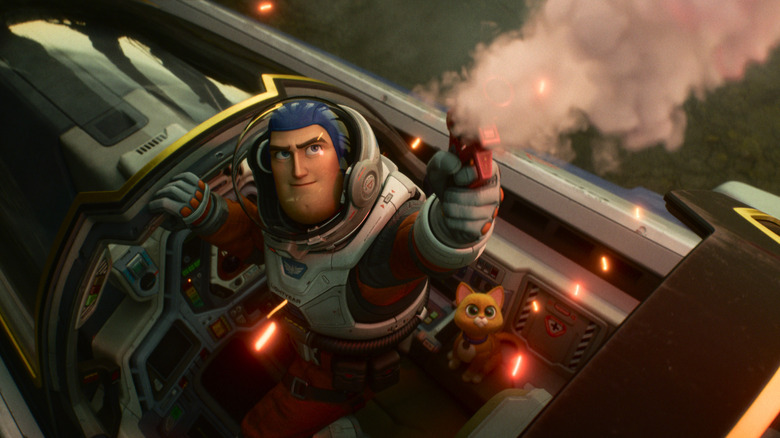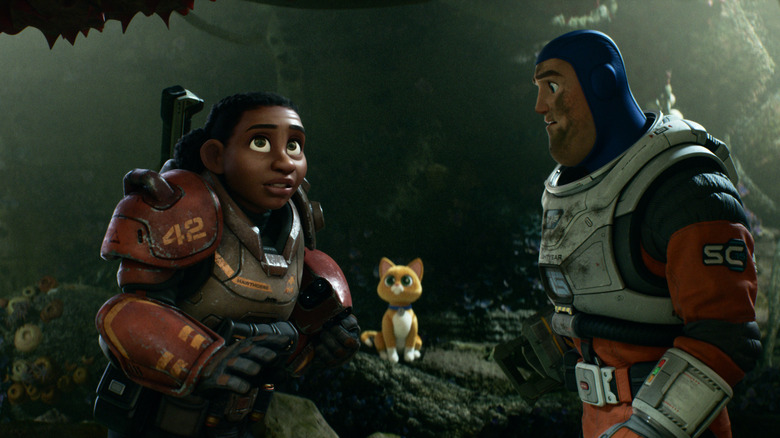Lightyear Spoiler Review: A Brand Deposit That Fails To Achieve Lift-Off
Expectations are the damnedest thing. Over nearly thirty years of making computer-animated feature films, Pixar Animation Studios has created a set of expectations that are gradually becoming impossible to overcome. Among its initial films, the studio made such wonderful original stories that seemed impossible to top. In the late-2000s, with a run of films like "Ratatouille," "Up," and "WALL-E," Pixar proved that it was as capable of pushing storytelling boundaries as well as the technological boundaries of animation. And even early in the studio's run, Pixar bucked the conventional wisdom that sequels are pale imitations of their predecessors, with the 1999 sequel "Toy Story 2" and then the 2010 capper "Toy Story 3." But the last decade-plus has been an up-and-down period for Pixar.
Some of their original films, such as "Inside Out," "Coco," and "Turning Red," are vibrant, exquisitely detailed, personal projects with keenly felt emotions and winning characters. However, some of their films are seeming cash-grab sequels like follow-ups to "Finding Nemo," "Cars," "The Incredibles," and "Toy Story," all of which were released over four consecutive summer-movie seasons. Pixar's true home base is its original stories. "Lightyear" isn't quite a sequel, and it isn't quite original, but it is a frustrating, often cynical, and opportunistic affair that stumbles from the start and never figures itself out.
Now, please, don't confuse yourself. This isn't a movie about Buzz Lightyear the toy, it's the character that ... well, you probably know that tweet from Chris Evans, who provides the voice of Buzz in this Angus MacLane film, pretty well by now. "Lightyear" opens with a series of title cards that attempt to clear things up as succinctly as possible, though it's arguably never been that hazy. If Andy Davis, the little boy from the first three "Toy Story" movies, once went gaga over his new birthday present, a brand-new Buzz Lightyear toy, then it stands to reason that said toy was derived from some piece of popular culture. And lo and behold, "Lightyear" is meant to be that piece of popular culture. Of course, there's a lot to wonder about even that brief explanation, as MacLane has said in interviews that he envisions "Lightyear" as a movie from 1986 that Andy eventually discovered and dug. That's arguably at odds with the fact that, in the first "Toy Story," Andy and all his pals seem pretty stoked at the surprise arrival of his last birthday gift, and if that gift is inspired by a decade-old movie ... would it really be that big a deal? There's also the curiosity of why, for instance, Andy got himself a Buzz Lightyear toy when he could have easily watched "Lightyear" and gravitated towards Sox (voiced by Pixar director Peter Sohn), a talking robot cat whose very existence seems to be to sell toys. And consider the recent tweet, in which Andy is depicted having brought all his toys to see "Lightyear." Leaving aside Andy's poor in-theater etiquette (did he buy tickets for all his toys? He didn't want to take off his hat to avoid blocking others' view of the screen?), if the toys saw "Lightyear" with their owner, wouldn't they know who the real Buzz Lightyear was?
The Real Buzz Lightyear
Okay. I will take a breath and imagine that I can guess what you're thinking. Probably something along the lines of "Does any of the nonsense in the last paragraph have anything, really, to do with the actual movie 'Lightyear'?" And of course, the answer is no. If you have somehow never seen any of the "Toy Story" films, you could watch "Lightyear" and, aside from being slightly befuddled by those opening title cards, have no problem grasping the story. It's about a heroic but selfish space ranger whose inadvertent mistake causes both him and his fellow Earthlings on a mission through uncharted space to be stranded on a seemingly hostile alien planet. Buzz's constant attempts to master a tricky hyperspeed fuel causes him to age at a much slower rate than his fellow humans, to the point where nearly a hundred years pass before the majority of the story kicks in, in which he faces off against — who else? — the evil Emperor Zurg (James Brolin), who has mysterious designs on Buzz, who has teamed up with the granddaughter (Keke Palmer) of his old space ranger pal, as well as a couple of other wannabe trainees.
But here's the thing. While it is absolutely correct that "Lightyear" doesn't have much to do with the sweaty and desperate attempts by Disney to explain the difference between this Buzz Lightyear and the Buzz Lightyear from the "Toy Story" franchise, the fact that so many people are fixating on those attempts highlights the true problem of this movie. It's key that we grasp, as Chris Evans has tried to communicate to us all for over a year, the difference between the Buzz of "Lightyear" and the Buzz of "Toy Story." In some ways, of course, that difference was made clear in the original "Toy Story." You may remember the line from Sheriff Woody (Tom Hanks) there — "You actually think you're the Buzz Lightyear? Oh, all this time I thought it was an act!" The Buzz of that series, over the course of the first two films, has to grapple with both the reality that he's not a space ranger, and with other characters from his "universe" who don't realize that they, too, are toys. But the Buzz Lightyear people enjoy isn't just voiced by Tim Allen — he's not "the" Buzz Lightyear.
And as evidenced by "Lightyear," "the" Buzz Lightyear is kind of a selfish, dull drip. It's not Evans' fault, to be fair. He's about as good as you would expect the former Captain America to be, and there are very few other actors who would easily fit as potential voices for the spaceman hero. Yet Evans, thanks to the script by MacLane and Jason Headley, is called upon to often say lines that Tim Allen said in the original series, in exactly the same way. You may recall Buzz's retort to the aforementioned sarcasm from Sheriff Woody — "You're mocking me, aren't you?" And if you don't, "Lightyear" is here to remind you, as Evans utters the line with basically the same cadence in the early going. There are a number of lines of dialogue that are repeated from the "Toy Story" films that serve to highlight how invaluable Tim Allen's voice work was in the first two "Toy Story" films. Buzz became less interesting in the later films, and Allen's performance became less memorable. But while Chris Evans tries to recall Allen in his line readings, he's just not able to do it. Instead, every time Buzz and his space-ranger friend Alisha (Uzo Aduba) say "To infinity ... and beyond," or when another reference to the original Buzz is made, it's akin to the bit from a "Simpsons" episode where Bart's classmates and teachers stare expectantly at him and urge him to say a random phrase that inexplicably turned him into an overnight sensation, and he does it halfheartedly to a round of cheers.
An origin story with no origin
The actual story of "Lightyear" has some halfhearted attempts to be exciting and thrilling, but aside from a slew of sci-fi references (to "Alien" and "Interstellar," among others) and a particularly visually dynamic first-act montage in which we watch Buzz try and fail to break the hyperspeed barrier and essentially skip through decades in just a few days, there's not a whole lot here. Buzz is no more filled in as a character here than the goofy faux-exposition on his toy box. He's a space ranger, he wants to do everything by himself, and he eventually caves in to accept help from Alisha's granddaughter Izzy, as well as the would-be cadets voiced by Taika Waititi and Dale Soules. Buzz's selfishness is the main theme of "Lightyear," as evidenced by the absolutely nonsensical reveal regarding Zurg. In the "Toy Story" films, there's a silly, tossed-off "Star Wars" riff in which we find out that Zurg is Buzz's father. Not the case here! No, Zurg is ... well, he's Buzz Lightyear, but old. There's a brief explanation related to an alternate timeline, in which Buzz's mission turned him bitter, sent him to the far reaches of space, and inspired him to ... suit himself up in some strange bad-guy suit, but the movie spends as much time trying to truly explain this twist as it is taking you to read this sentence.
As I type these words, "Lightyear" is potentially facing down an opening weekend at the box office where it's taken down by the second weekend of "Jurassic World Dominion." I'll freely admit that I expected "Lightyear" to do much better at the box office. Yes, it's a fairly naked cash-grab, but "Toy Story 4" and "Incredibles II" were massive box-office hits without being truly special films. It will be easy — for commentators as well as for Disney itself — to look towards the culture-war trash transpiring online and choose to blame "Lightyear" for being too progressive or too diverse. Evans and Brolin are joined by Bill Hader, who delivers a first-act cameo performance, as the only white men in the cast, and Alisha is one-half of a loving lesbian couple. That "Lightyear" is a diverse film with progressive representation is, let us be very clear, an unequivocally good thing. Pixar's earliest films are pretty white-focused among its casts. (It took them until "Brave" to have a non-white-man play the lead of one of their titles.) "Lightyear" has many, many problems, but being a film with a diverse cast is one of its few positives.
The issue related to this film's cast is not that it's diverse. It's that the rest of the cast functions as support for a story about a white guy who learns to get over himself, which is not exactly a groundbreaking idea, for Pixar let alone Hollywood. "Lightyear" may prove — though it's certainly too early to know for sure — to be a more tepid release at the box office such that Disney CEO Bob Chapek decides that more and more animated films should skip theaters altogether. I mean, hey, "Encanto" only became a massive hit once people started watching it on Disney+, right? But think about the flip side of this argument. Why did "Lightyear" not do well at the box office? The reviews weren't impressive, nor should they have been — this is an inert sci-fi adventure that may well be the studio's weakest since "Cars 2". But bad reviews aren't a death knell at the box office. And the family-film competition is sparse. Over the course of the pandemic, Disney has — intentionally or otherwise — encouraged audiences to wait for streaming for their animated films. It's a shame, too, because three of Pixar's most ambitious films ("Soul," "Luca," and "Turning Red") were sent straight to streaming. They were striking, visually distinctive, emotional, warm, sincere movies. "Lightyear," conversely, is overly familiar, visually drab, and too often willing to mock sincerity or earnestness, as when things as simple as Buzz sending his mission logs to Star Command is lampooned as just being him talking to himself.
In short: Disney sent some of Pixar's best original films to streaming, but they sent this to theaters instead. It gives me no joy to be so disappointed with "Lightyear," but it gave me no joy to miss out on some of the studio's finest films on a screen larger than an HDTV. Just as Buzz Lightyear makes mistakes here constantly and only learns too late to do something differently, Disney screwed up here. They might not listen to reason until it's too late. For Pixar, we can only hope that this will truly, hopefully, finally be the last gasp of the "Toy Story" franchise. It's Okay to send them off into the sunset. We've all grown up enough.


